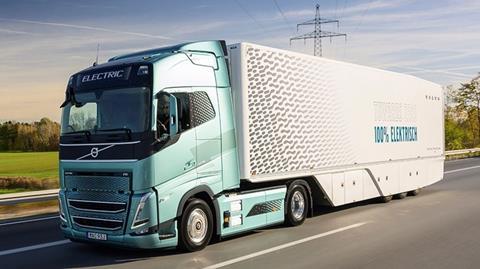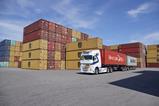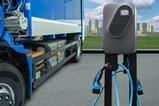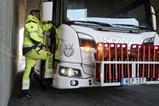Maersk, a prominent player in the logistics industry known for its focus on sustainability, has recently unveiled an initiative aimed at reducing greenhouse gas (GHG) emissions in hinterland container transports.

The company plans to achieve this by procuring 25 Volvo FH electric trucks in Germany. This strategic investment underscores Maersk’s dedication to decarbonising global logistics and its goal of becoming a net-zero company across all business sectors and modes of transport by 2040.
”Recognising the pressing need to address the environmental impact of logistics, we are taking a bold step forward by ordering 25 advanced e-trucks. These cutting-edge vehicles, powered by renewable energy sources, hold immense potential in substantially curbing carbon emissions and further reducing Maersk’s carbon footprint. We see a rising demand from our customers for cleaner end-to-end transportation solutions with minimal greenhouse gas (GHG) emissions. Equally important, the deployment of e-trucks is expected to alleviate noise emissions in the residential areas surrounding the warehouses where they will be operationalized” said Jens-Ole Krenzien, Maersk Managing Director North Europe Continent.
Maersk plans to employ these e-trucks for local deliveries in various locations, including its upcoming large warehouse in Duisburg, set to open this summer, and the Bremen/Bremerhaven region, which serves as one of Maersk’s primary gateway ports in Germany. Furthermore, the company is considering the use of e-trucks for shunting containers within warehouse areas to eliminate even smaller sources of GHG emissions along the transportation chain.
In addition to the recent German order, Maersk had previously placed an order for 110 Volvo VNR electric trucks for North America, bringing its total commitment in the United States to 126 Volvo trucks, along with 300 e-trucks through its partner Einride. Maersk is actively pursuing more e-truck initiatives in other countries and exploring low GHG emission rail solutions based on renewable energy, as available in Germany, or climate-neutral biofuels, as recently announced in Spain.
The successful deployment of e-trucks in the United States, coupled with the increasing demand from customers for climate-neutral hinterland logistics, makes the German order a natural progression in Maersk’s ongoing efforts to further decarbonize hinterland logistics. It is important to note that e-trucking is still in its early stages, and challenges such as higher total cost of ownership, extended project deployment times due to infrastructure limitations, and operational inefficiencies exist. Overcoming these challenges requires collaborative efforts from industry players, customers, and governments. Maersk aims to take a leadership role in driving demand for e-trucks and infrastructure, contributing to breaking the chicken-and-egg situation and inspiring others to follow suit.
“The successful deployment of e-trucks in the US and the rising demand of many customers for climate-neutral hinterland logistics made the German order a logical next step in our efforts to further decarbonise,” said Julia Heil, Head of Energy Transition Execution at Maersk in Copenhagen. She added it was still early days in e-trucking, but challenges could be overcome if all industry players, customers and governments worked together. “By taking a lead on demand for e-trucks and infrastructure, we want to play our part of unlocking the chicken-and-egg situation and inspire others to follow along.”


















